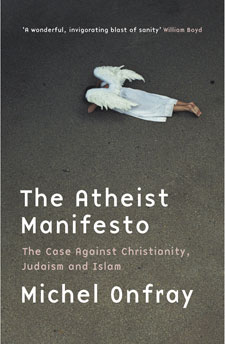It seems that in recent times that some atheists have become more and more "evangelistic', in the sense of actively trying to convert people to their point of view. With a title such as The Atheist Manifesto, it should come as no surprise that this is the intention of Michael Onfray's new book.
While the subtitle of the book is *The case against Christianity, Judaism and Islam*, Christianity seems to be the primary target in his sights. Onfray attacks all three religions, but pays special attention to Christianity. It seems to me that by blurring the distinctions between the three monotheistic religions he is attempting to shift the public attitude of fear of fanatical Islam onto monotheism more generally.
 As a Christian, I found The Atheist Manifesto an uncomfortable book to read. Onfray uses quite strong and emotive language at every turn to attempt to discredit monotheism, such as "[M]en " when they take it into their heads to give birth to one God " do so in their own violent, jealous, vengeful, misogynistic, aggressive, tyrannical, intolerant image" (p65), or "In science the church has always been wrong about everything" (p83), or "The religions of the book detest women" (p102).
As a Christian, I found The Atheist Manifesto an uncomfortable book to read. Onfray uses quite strong and emotive language at every turn to attempt to discredit monotheism, such as "[M]en " when they take it into their heads to give birth to one God " do so in their own violent, jealous, vengeful, misogynistic, aggressive, tyrannical, intolerant image" (p65), or "In science the church has always been wrong about everything" (p83), or "The religions of the book detest women" (p102).
Onfray makes some extraordinary claims, such as the suggestion that the Jesus of the New Testament is largely an "ideological fabrication'. Whether a historical Jesus ever existed is an "impossible debate', but Onfray leaves us in no doubt that the Jesus of the New Testament is fiction. "Who is the author of Jesus? Mark. The evangelist Mark, first author of the wonderful adventures of the said Jesus" (p121).
As someone who loves God and loves the truth, much of this book made my stomach churn. Many questions swirled around in my head. However, the book lacks a single footnote, making it impossible to verify some of his radical claims about history, philosophy or theology. In a work published by a university press and written by a philosophy lecturer, I feel that this lack of referencing is academically irresponsible.
One of the central theses of this book is that Christianity in particular, and monotheism generally, has a hatred of the body, of sex, and of women. He claims that all teach as ascetic ideal, of transcending the body into the spiritual realm. To my mind, this is a more appropriate description of Gnosticism than biblical Christianity. The Bible clearly teaches against this asceticism, "Husband and wives: Have lots of sex and enjoy each other's bodies." 1 Corinthians 7:4-5 (my paraphrase).
The force of the Onfray's argument comes not from logic and reason, but from emotion. The discomfort that Christians, Jews or Muslims would feel from his attacks result more from Onfray's emotive use of language than from the truth or logic of his position.
A fascinating glimpse into the effects of the fully implemented atheism that Onfray is promoting can be found on pages 49-51, where he argues for a removal of Judeo-Christian worldview from the legal system. He rightly notes that the legal system's insistence of people being responsible agents and therefore accountable and punishable for their actions comes from the understanding of the relationship between man and God found in Genesis 1-3. Onfray rejects this, comparing a child-rapist to a person suffering from a brain tumour, denying that they should be locked. There is no place for punishment in the atheistic worldview, perhaps only treatment. The moral bankruptcy of atheism is on view in a quite disturbing fashion.
If you are going to read The Atheist Manifesto, be prepared to be challenged. It is not a pleasant book to read, but you may come out at the other end with an appreciation of the way that God's truth protects us from such obvious false paths of thinking.

























